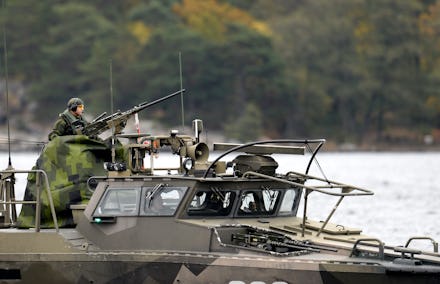Sweden Is Hunting a Possible Rogue Submarine in Its Own Backyard

The news: This is a sight that brings to mind the Cold War: Sweden is combing the Baltic Sea, hunting down what may be a mystery submarine that has been seen multiple times in the last few days.
The Swedish armed forces have described the possible submarine as "foreign underwater activity," and have mobilized more than 200 troops in the search. The vessel might be damaged, as sources reported intercepting a radio transmission in Russian on an emergency frequency.
"It could be a submarine, or a smaller submarine," Rear Admiral Anders Grenstad said in a news conference. "It could be divers using some form of moped-like underwater vehicle and it could be divers that don't have any business on our territory."
Signs point to Russia, but Sweden won't announce its suspicions. As soon as news of the mystery vessel's appearance broke, the Swedish media started speculating that Russia was involved. And while Stockholm has confirmed that the sightings took place in "an area that is of interest to a foreign power," it hasn't come right out and accused Russia of the incursion.
For its part, Russia preemptively denied its ships were taking inappropriate actions or in distress.
"Russian Navy ships and submarines are fulfilling their duties in the world ocean waters in accordance with the plan," a ministry representative told the Interfax news agency. "There has been and there are no extraordinary, let alone emergency, situations involving Russian warships."
But Europe remains wary of Russia. Europe's relationship with Russia has soured since the Ukrainian crisis, and recent clashes have not improved the situation. Just last week, Finland accused Russia of interfering with a Finnish research vessel in international waters, and last month, Sweden reported that Russia committed a "serious violation" by allowing two of its airplanes to enter Swedish airspace.
And whether the mystery vessel turns out to be Russian or not, Sweden is flexing its muscle in a show of power.
"We have a different political security situation in the Baltic now, which means we react more quickly and more clearly state that we don't accept this," Grenstad told Bloomberg Businessweek. "If we verify the underwater presence of a foreign power, we will then need to figure out how we can make this stop. It's not about sinking a submarine, it's more about establishing that this is going on."
Until then, the search goes on in the murky waters of the Baltic.